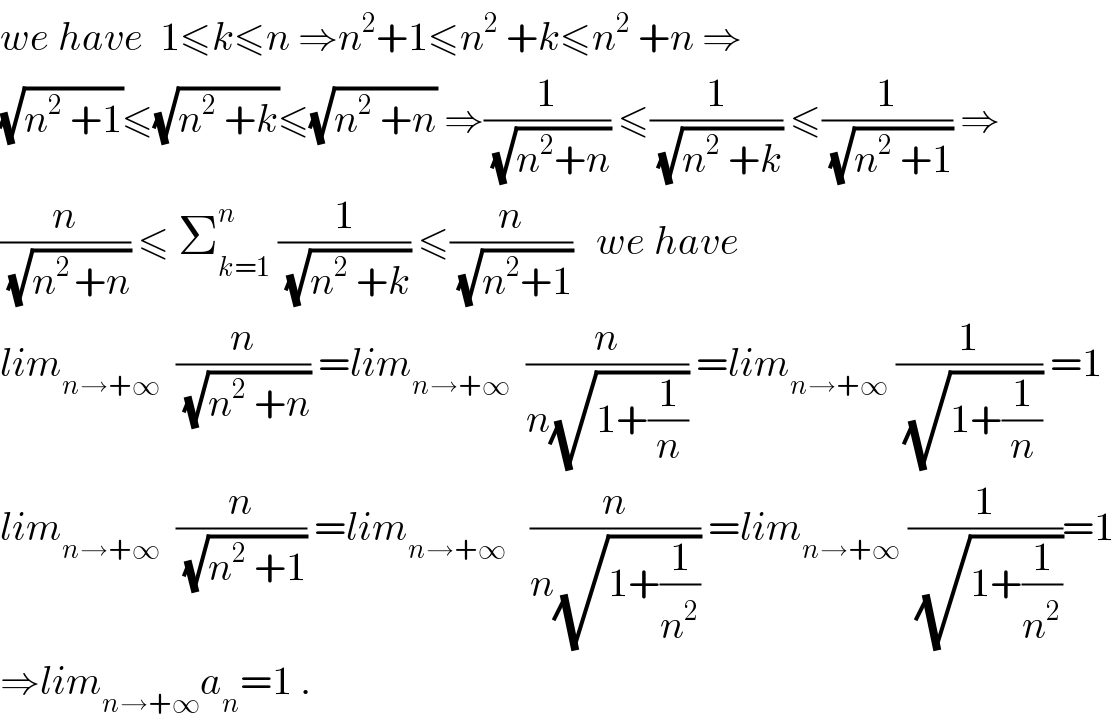Question Number 67996 by TawaTawa last updated on 03/Sep/19

Commented by mathmax by abdo last updated on 03/Sep/19

$${we}\:{have}\:\:\mathrm{1}\leqslant{k}\leqslant{n}\:\Rightarrow{n}^{\mathrm{2}} +\mathrm{1}\leqslant{n}^{\mathrm{2}} \:+{k}\leqslant{n}^{\mathrm{2}} \:+{n}\:\Rightarrow \\ $$$$\sqrt{{n}^{\mathrm{2}} \:+\mathrm{1}}\leqslant\sqrt{{n}^{\mathrm{2}} \:+{k}}\leqslant\sqrt{{n}^{\mathrm{2}} \:+{n}}\:\Rightarrow\frac{\mathrm{1}}{\:\sqrt{{n}^{\mathrm{2}} +{n}}}\:\leqslant\frac{\mathrm{1}}{\:\sqrt{{n}^{\mathrm{2}} \:+{k}}}\:\leqslant\frac{\mathrm{1}}{\:\sqrt{{n}^{\mathrm{2}} \:+\mathrm{1}}}\:\Rightarrow \\ $$$$\frac{{n}}{\:\sqrt{{n}^{\mathrm{2}\:} +{n}}}\:\leqslant\:\sum_{{k}=\mathrm{1}} ^{{n}} \:\frac{\mathrm{1}}{\:\sqrt{{n}^{\mathrm{2}} \:+{k}}}\:\leqslant\frac{{n}}{\:\sqrt{{n}^{\mathrm{2}} +\mathrm{1}}}\:\:\:{we}\:{have} \\ $$$${lim}_{{n}\rightarrow+\infty} \:\:\frac{{n}}{\:\sqrt{{n}^{\mathrm{2}} \:+{n}}}\:={lim}_{{n}\rightarrow+\infty} \:\:\frac{{n}}{{n}\sqrt{\mathrm{1}+\frac{\mathrm{1}}{{n}}}}\:={lim}_{{n}\rightarrow+\infty} \:\frac{\mathrm{1}}{\:\sqrt{\mathrm{1}+\frac{\mathrm{1}}{{n}}}}\:=\mathrm{1} \\ $$$${lim}_{{n}\rightarrow+\infty} \:\:\frac{{n}}{\:\sqrt{{n}^{\mathrm{2}} \:+\mathrm{1}}}\:={lim}_{{n}\rightarrow+\infty} \:\:\:\frac{{n}}{{n}\sqrt{\mathrm{1}+\frac{\mathrm{1}}{{n}^{\mathrm{2}} }}}\:={lim}_{{n}\rightarrow+\infty} \:\frac{\mathrm{1}}{\:\sqrt{\mathrm{1}+\frac{\mathrm{1}}{{n}^{\mathrm{2}} }}}=\mathrm{1} \\ $$$$\Rightarrow{lim}_{{n}\rightarrow+\infty} {a}_{{n}} =\mathrm{1}\:. \\ $$
Commented by mathmax by abdo last updated on 03/Sep/19
![b_n =Σ_(k=1) ^n (1/( (√(n+k)))) we have 1≤k≤n ⇒n+1 ≤n+k≤2n ⇒ (√(n+1))≤(√(n+k))≤(√(2n)) ⇒(1/( (√(2n)))) ≤(1/( (√(n+k)))) ≤(1/( (√(n+1)))) ⇒ (1/( (√(n+k)))) ≥(1/( (√(2n)))) but lim_(n→+∞) (1/( (√(2n)))) =+∞ ⇒lim_(n→+∞) b_n =+∞ c_n =(1/n)Σ_(k=n) ^(2n) (1/k) changement of indice k−n =i give c_n =(1/n)Σ_(i=0) ^n (1/(n+i)) =(1/n){(1/n)Σ_(i=0) ^n (1/(1+(i/n)))} we have lim_(n→+∞) (1/n)Σ_(i=0) ^n (1/(1+(i/n))) =∫_0 ^1 (dx/(1+x)) =[ln∣1+x∣]_0 ^1 =ln(2) ⇒ lim_(n→+∞) c_n =0](https://www.tinkutara.com/question/Q68020.png)
$${b}_{{n}} =\sum_{{k}=\mathrm{1}} ^{{n}} \:\frac{\mathrm{1}}{\:\sqrt{{n}+{k}}}\:\:\:{we}\:{have}\:\mathrm{1}\leqslant{k}\leqslant{n}\:\Rightarrow{n}+\mathrm{1}\:\leqslant{n}+{k}\leqslant\mathrm{2}{n}\:\Rightarrow \\ $$$$\sqrt{{n}+\mathrm{1}}\leqslant\sqrt{{n}+{k}}\leqslant\sqrt{\mathrm{2}{n}}\:\Rightarrow\frac{\mathrm{1}}{\:\sqrt{\mathrm{2}{n}}}\:\leqslant\frac{\mathrm{1}}{\:\sqrt{{n}+{k}}}\:\leqslant\frac{\mathrm{1}}{\:\sqrt{{n}+\mathrm{1}}}\:\Rightarrow \\ $$$$\frac{\mathrm{1}}{\:\sqrt{{n}+{k}}}\:\geqslant\frac{\mathrm{1}}{\:\sqrt{\mathrm{2}{n}}}\:\:{but}\:\:{lim}_{{n}\rightarrow+\infty} \:\:\frac{\mathrm{1}}{\:\sqrt{\mathrm{2}{n}}}\:=+\infty\:\Rightarrow{lim}_{{n}\rightarrow+\infty} \:\:\:{b}_{{n}} =+\infty \\ $$$${c}_{{n}} =\frac{\mathrm{1}}{{n}}\sum_{{k}={n}} ^{\mathrm{2}{n}} \:\frac{\mathrm{1}}{{k}}\:\:{changement}\:{of}\:{indice}\:{k}−{n}\:={i}\:\:{give} \\ $$$${c}_{{n}} =\frac{\mathrm{1}}{{n}}\sum_{{i}=\mathrm{0}} ^{{n}} \:\frac{\mathrm{1}}{{n}+{i}}\:=\frac{\mathrm{1}}{{n}}\left\{\frac{\mathrm{1}}{{n}}\sum_{{i}=\mathrm{0}} ^{{n}} \:\:\frac{\mathrm{1}}{\mathrm{1}+\frac{{i}}{{n}}}\right\}\:{we}\:{have} \\ $$$${lim}_{{n}\rightarrow+\infty} \:\:\frac{\mathrm{1}}{{n}}\sum_{{i}=\mathrm{0}} ^{{n}} \:\frac{\mathrm{1}}{\mathrm{1}+\frac{{i}}{{n}}}\:=\int_{\mathrm{0}} ^{\mathrm{1}} \:\:\frac{{dx}}{\mathrm{1}+{x}}\:=\left[{ln}\mid\mathrm{1}+{x}\mid\right]_{\mathrm{0}} ^{\mathrm{1}} ={ln}\left(\mathrm{2}\right)\:\Rightarrow \\ $$$${lim}_{{n}\rightarrow+\infty} \:\:\:{c}_{{n}} =\mathrm{0} \\ $$
Commented by TawaTawa last updated on 03/Sep/19

$$\mathrm{God}\:\mathrm{bless}\:\mathrm{you}\:\mathrm{sir} \\ $$
Commented by Abdo msup. last updated on 04/Sep/19

$${you}\:{are}\:{welcome}. \\ $$
Answered by mind is power last updated on 03/Sep/19
![a_n =Σ_(k=1) ^n (1/( (√(n^2 +k)))) ∀k∈[1,n] (1/( (√(n^2 +n))))≤(1/( (√(n^2 +k))))≤(1/( (√(n^2 +1)))) ⇒Σ_(k=1) ^n (1/( (√(n^2 +n))))≤a_n ≤Σ_(k=1) ^n (1/( (√(n^2 +1)))) ⇒(n/( (√(n^2 +n))))≤a_n ≤(n/( (√(n^2 +1)))) ⇒lima_n =1 Σ_(k=1 ) ^n (1/( (√(n+k))))=b_n ∀k (1/( (√(n+k))))≥(1/( (√(n+n))))=(1/( (√(2n)))) ⇒Σ_(k=1 ) ^n (1/( (√(n+k))))≥Σ(1/( (√(2n))))=(n/( (√(2n))))=(√(n/2)) ⇒b_n →+∞ c_n =(1/n)Σ_n ^(2n) (1/k)=(1/n_ )Σ_(k=n) ^(k=2n) (1/k) we show Σ_(k=n) ^(k=2n) (1/k_ ) cv ⇒c_n →0 Σ_n ^(2n) (1/k)=Σ_(k=0) ^n (1/(2n−k))=(1/n)Σ_(k=0) ^n (1/(2−(k/n))) let f(x)=(1/(2−x)) ⇒(1/n)Σ_(k=0) ^n (1/(2−(k/n)))=(1/n)Σ_(k=0) ^n f((k/n))=∫_0 ^1 f(x)dx reiman ∫_0 ^1 f(x)dx=∫_0 ^1 (1/(2−x))dx=[−ln(2−x)]_0 ^1 =ln(2) ⇒Σ_(k=n) ^(2n) (1/k)→ln(2) ⇒(1/n)Σ_(k=n) ^(k=2n) →0](https://www.tinkutara.com/question/Q68002.png)
$${a}_{{n}} =\sum_{{k}=\mathrm{1}} ^{{n}} \frac{\mathrm{1}}{\:\sqrt{{n}^{\mathrm{2}} +{k}}} \\ $$$$\forall{k}\in\left[\mathrm{1},{n}\right] \\ $$$$\:\frac{\mathrm{1}}{\:\sqrt{{n}^{\mathrm{2}} +{n}}}\leqslant\frac{\mathrm{1}}{\:\sqrt{{n}^{\mathrm{2}} +{k}}}\leqslant\frac{\mathrm{1}}{\:\sqrt{{n}^{\mathrm{2}} +\mathrm{1}}} \\ $$$$\Rightarrow\sum_{{k}=\mathrm{1}} ^{{n}} \frac{\mathrm{1}}{\:\sqrt{{n}^{\mathrm{2}} +{n}}}\leqslant{a}_{{n}} \leqslant\sum_{{k}=\mathrm{1}} ^{{n}} \frac{\mathrm{1}}{\:\sqrt{{n}^{\mathrm{2}} +\mathrm{1}}} \\ $$$$\Rightarrow\frac{{n}}{\:\sqrt{{n}^{\mathrm{2}} +{n}}}\leqslant{a}_{{n}} \leqslant\frac{{n}}{\:\sqrt{{n}^{\mathrm{2}} +\mathrm{1}}} \\ $$$$\Rightarrow{lima}_{{n}} =\mathrm{1} \\ $$$$\sum_{{k}=\mathrm{1}\:} ^{{n}} \frac{\mathrm{1}}{\:\sqrt{{n}+{k}}}={b}_{{n}} \\ $$$$\forall{k}\:\:\frac{\mathrm{1}}{\:\sqrt{{n}+{k}}}\geqslant\frac{\mathrm{1}}{\:\sqrt{{n}+{n}}}=\frac{\mathrm{1}}{\:\sqrt{\mathrm{2}{n}}} \\ $$$$\Rightarrow\sum_{{k}=\mathrm{1}\:} ^{{n}} \frac{\mathrm{1}}{\:\sqrt{{n}+{k}}}\geqslant\Sigma\frac{\mathrm{1}}{\:\sqrt{\mathrm{2}{n}}}=\frac{{n}}{\:\sqrt{\mathrm{2}{n}}}=\sqrt{\frac{{n}}{\mathrm{2}}} \\ $$$$\Rightarrow{b}_{{n}} \rightarrow+\infty \\ $$$${c}_{{n}} =\frac{\mathrm{1}}{{n}}\sum_{{n}} ^{\mathrm{2}{n}} \frac{\mathrm{1}}{{k}}=\frac{\mathrm{1}}{{n}_{\:} }\sum_{{k}={n}} ^{{k}=\mathrm{2}{n}} \frac{\mathrm{1}}{{k}} \\ $$$${we}\:{show}\:\sum_{{k}={n}} ^{{k}=\mathrm{2}{n}} \frac{\mathrm{1}}{{k}_{} }\:{cv}\:\Rightarrow{c}_{{n}} \rightarrow\mathrm{0} \\ $$$$\sum_{{n}} ^{\mathrm{2}{n}} \frac{\mathrm{1}}{{k}}=\sum_{{k}=\mathrm{0}} ^{{n}} \frac{\mathrm{1}}{\mathrm{2}{n}−{k}}=\frac{\mathrm{1}}{{n}}\sum_{{k}=\mathrm{0}} ^{{n}} \frac{\mathrm{1}}{\mathrm{2}−\frac{{k}}{{n}}} \\ $$$${let}\:{f}\left({x}\right)=\frac{\mathrm{1}}{\mathrm{2}−{x}} \\ $$$$\Rightarrow\frac{\mathrm{1}}{{n}}\sum_{{k}=\mathrm{0}} ^{{n}} \frac{\mathrm{1}}{\mathrm{2}−\frac{{k}}{{n}}}=\frac{\mathrm{1}}{{n}}\sum_{{k}=\mathrm{0}} ^{{n}} {f}\left(\frac{{k}}{{n}}\right)=\int_{\mathrm{0}} ^{\mathrm{1}} {f}\left({x}\right){dx}\:\:{reiman} \\ $$$$\int_{\mathrm{0}} ^{\mathrm{1}} {f}\left({x}\right){dx}=\int_{\mathrm{0}} ^{\mathrm{1}} \frac{\mathrm{1}}{\mathrm{2}−{x}}{dx}=\left[−{ln}\left(\mathrm{2}−{x}\right)\right]_{\mathrm{0}} ^{\mathrm{1}} ={ln}\left(\mathrm{2}\right)\: \\ $$$$\Rightarrow\sum_{{k}={n}} ^{\mathrm{2}{n}} \frac{\mathrm{1}}{{k}}\rightarrow{ln}\left(\mathrm{2}\right) \\ $$$$\Rightarrow\frac{\mathrm{1}}{{n}}\sum_{{k}={n}} ^{{k}=\mathrm{2}{n}} \rightarrow\mathrm{0} \\ $$$$ \\ $$$$ \\ $$
Commented by TawaTawa last updated on 03/Sep/19

$$\mathrm{God}\:\mathrm{bless}\:\mathrm{you}\:\mathrm{sir} \\ $$
